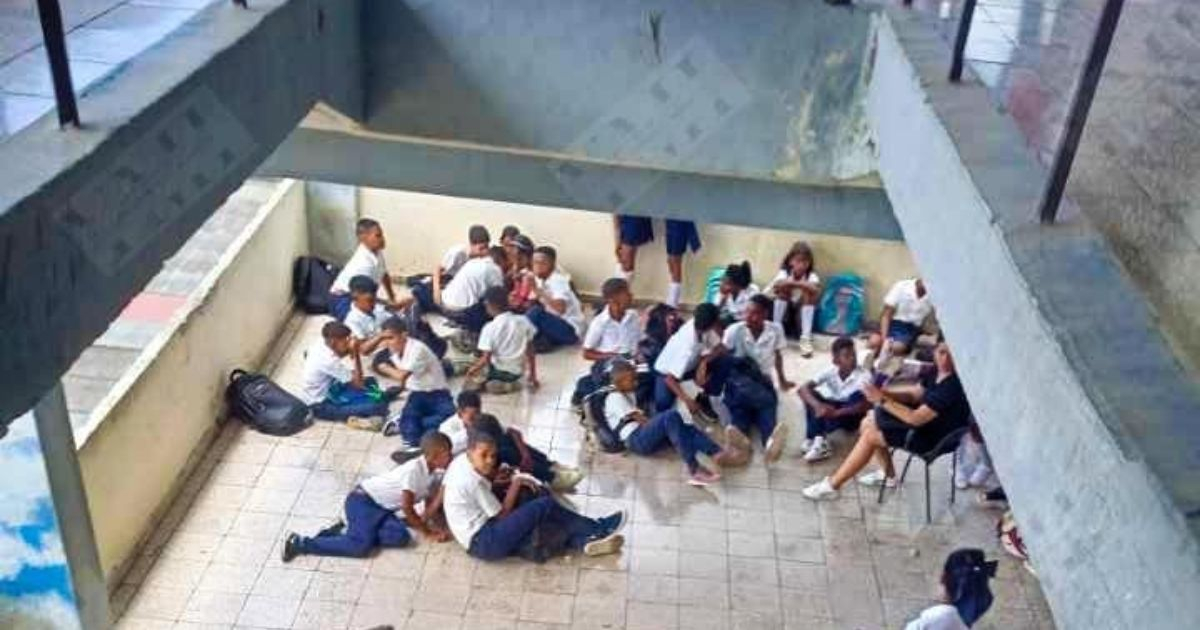Despite the Cuban regime's announcement that conditions were set for the start of the 2024-2025 school year, the reality starkly contrasts with the official propaganda. In schools across Santiago de Cuba, students are compelled to sit on classroom floors or in hallways due to the absence of chairs and desks. This situation, as reported by journalist Yosmany Mayeta on Facebook, exposes the lies of the Cuban government.
Mayeta shared images from the Eugenio Noques Vera School, showing students in unsuitable conditions, highlighting the inability of educational institutions to adequately accommodate all students. Some internet users informed the journalist that “there is no capacity to house the students in the school,” a problem that is affecting young people without any foreseeable solution from government officials or the educational sector.
The deterioration of facilities and lack of adequate furniture exacerbate the situation, leaving parents worried about the conditions in which their children are receiving their education. Mayeta called on parents and the community at large not to allow this regrettable situation to persist, as students are the primary victims of the authorities' inaction.
In the comments section, Ana Idelys complained that her son, who is in eighth grade at the Abel Santamaría Secondary School in Micro 1A, spends entire mornings sitting in parks due to the lack of a classroom. "It is disrespectful what is being done to the students. The snack is bad, the yogurt is sour and warm, and the bread is not worth mentioning. Some parents complained to the school administration, but the principal said it is the municipality and the province that do not want to provide a solution," she noted.
This situation is not new in the schools of Santiago de Cuba. Last Monday, Mayeta echoed the frustration and anxiety of parents whose children, upon attending school, encountered chaotic conditions. “Our page received this complaint from the Francisco Maceo Osorio Basic Secondary School in Altamira, where students have to sit on the floor due to the lack of desks and chairs,” he pointed out.
“There are no conditions to place the students, and some teachers at the center do not agree to work under such circumstances,” a mother told the journalist.
In August, prior to the start of the school year, a Cuban mother erupted on social media over the poor conditions of the classroom where her child would be taught. Lianet Oyasita, a resident of Havana, shared a video on her Facebook wall showing the fourth-grade classroom, clarifying that the other classrooms were in similar conditions.
Similarly, a Cuban mother expressed outrage, denouncing that the primary school her child attends in Havana is surrounded by sewage water and has a gigantic garbage dump at the corner. The children of the José Manuel Lazo de la Vega Quintana Special School in Marianao attend classes in an unsanitary environment. They must use a dangerous manhole cover as a step to access the educational center, and the stench reaches the classrooms.
Key Issues in Cuban Education System
Given the dire conditions faced by students in Santiago de Cuba, many questions arise about the broader issues within the Cuban education system. Below are some frequently asked questions that shed light on this troubling situation.
What are the main issues faced by students in Santiago de Cuba?
Students in Santiago de Cuba are dealing with a severe lack of chairs and desks, forcing them to sit on the floor or in hallways. This highlights broader infrastructural and resource deficiencies in the Cuban education system.
Who has reported on these educational challenges in Santiago de Cuba?
Journalist Yosmany Mayeta has reported extensively on these issues, sharing images and accounts from affected schools on social media.
What has been the response from school officials and the government?
School officials have largely deflected responsibility, attributing the lack of solutions to higher authorities in the municipality and province. There has been no significant action from the government to address these issues.
How are parents reacting to the situation?
Parents are expressing significant frustration and concern over the inadequate educational conditions. Some have taken to social media to voice their complaints and demand action.
